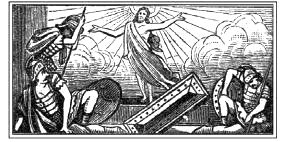
| Contents | Aeterne rerum conditor Maker of all, eternal King |
TempusPerAnnum |

This hymn (minus the final doxology) was written by St. Ambrose (340-397). The hymn is filled with Scriptural allusions and is one of the finest hymns in the Liturgy. Formerly it was used in the Roman Breviary at Sunday Lauds after Epiphany until Lent, and then again from September 28 until November 26. Today the hymn is used in the Liturgy of the Hours (less verses five and six) for Sunday Lauds on the first and third Sundays of the Psalter during Ordinary Time.
|
| AETERNE rerum conditor, noctem diemque qui regis, et temporum das tempora, ut alleves fastidium; |
MAKER of all, eternal King, who day and night about dost bring: who weary mortals to relieve, dost in their times the seasons give: |
| Praeco diei iam sonat, noctis profundae pervigil, nocturna lux viantibus a nocte noctem segregans.1 |
Now the shrill cock proclaims the day, and calls the sun's awakening ray, the wandering pilgrim' guiding light, that marks the watches night by night. |
| Hoc excitatus lucifer solvit polum caligine, hoc omnis erronum chorus2 vias nocendi deserit. |
Roused at the note, the morning star heaven's dusky veil uplifts afar: night's vagrant bands no longer roam, but from their dark ways hie them home. |
| Hoc nauta vires colligit pontique mitescunt freta, hoc ipsa petra ecclesiae canente culpam diluit. |
The encouraged sailor's fears are o'er, the foaming billows rage no more: Lo! e'en the very Church's Rock melts at the crowing of the cock. |
| Surgamus ergo strenue! Gallus iacentes excitat, et somnolentos increpat, Gallus negantes arguit. |
O let us then like men arise; the cock rebukes our slumbering eyes, bestirs who still in sleep would lie, and shames who would their Lord deny. |
| Gallo canente spes redit, aegris salus refunditur, mucro latronis conditur, lapsis fides revertitur. |
New hope his clarion note awakes, sickness the feeble frame forsakes, the robber sheathes his lawless sword, faith to fallen is restored. |
| Iesu, labantes respice, et nos videndo corrige, si respicis, lapsus cadunt,3 fletuque culpa solvitur. |
Look in us, Jesu, when we fall, and with Thy look our souls recall: if Thou but look, our sins are gone, and with due tears our pardon won. |
| Tu lux refulge sensibus, mentisque somnum discute, te nostra vox primum sonet et ore psallamus tibi.4 |
Shed through our hearts Thy piercing ray, our soul's dull slumber drive away: Thy Name be first on every tongue, to Thee our earliest praises sung. |
| Sit, Christe, Rex piissime, tibi Patrique gloria cum Spiritu Paraclito, in sempiterna saecula. Amen. |
All laud to God the Father be; all praise, Eternal Son, to Thee; all glory, as is ever meet, to God the Holy Paraclete. Amen. |
<- Prev |
Next-> |
